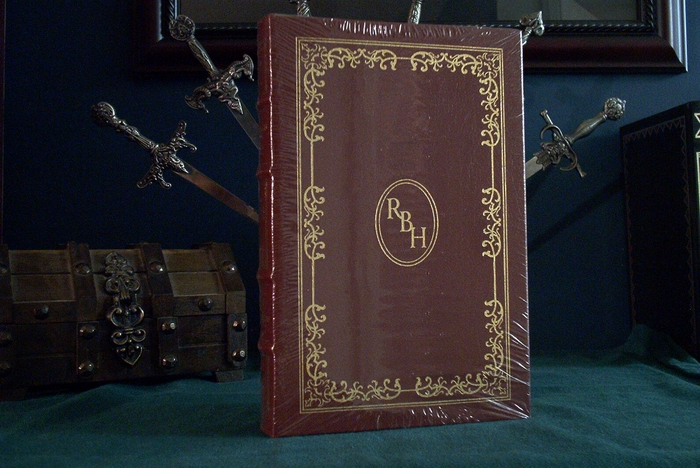Easton Press Rutherford B. Hayes books
Rutherford Hayes: Statesman of Reunion - H. J. Eckenrode - 1988
Rutherford Hayes: Warrior and President - Ari HoogenBoom - 1996
(This page contains affiliate links for which we may be compensated.)
President Rutherford B. Hayes biography
Rutherford Birchard Hayes (1822 - 1893), nineteenth President of the United States, born in Delaware, Ohio, and educated at Kenyon College and Harvard Law School. He was admitted to the Ohio bar in 1845. After practicing law for several years at lower Sandusky (now Fremont), he moved in 1850 to Cincinnati, where he became a prominent lawyer. He was active in 1856 in the first Presidential campaign conducted by the Republican Party. From 1858 until 1861 he served as city solicitor of Cincinnati. Following the outbreak of the Civil War, he was commissioned a major in the Union Army. He served with distinction throughout the war, rising to the rank of colonel in 1862 and brigadier general in 1864. In 1862 he was brevetted a major general. His distinguished war record gave him a popular reputation in his home State; and in 1864, while still in the army he was nominated and elected a United States representative from Ohio, on the Republican ticket. Re-elected in 1886, he remained in Congress until November, 1867, when he was elected Governor of Ohio. In 1876, while serving his third term as Governor, Rutherford Hayes was nominated by the Republican Party as its candidate for President of the United States. Samuel J. Tilden received the nomination for the Democratic Party. The election was closely contested and the electoral votes of several States were challenged in Congress, which established a commission to adjudge the contest returns, the commission rejected Tilden's claims and Rutherford Hayes won by a majority of one electoral vote, the count was 185 to 184.
The Rutherford B. Hayes' administration pursued a conciliatory policy toward the defeated Confederate States; because President Rutherford Hayes withdrew the Federal occupation troops from the South, he incurred the hostility of many Republicans. His advocacy of civil service reform also antagonized various Republican Politicians. In fiscal affairs, he endorsed the resumption of specie payments by the Government, and recommended that Government bonds be paid in gold. After his first term expired, President Rutherford B. Hayes retired to private life.
Statesman of Reunion
Rutherford Hayes: Statesman of Reunion" by H. J. Eckenrode is a compelling biography that offers a nuanced portrayal of the 19th President of the United States. Eckenrode, a respected historian of the Reconstruction era, presents Hayes as a pivotal figure in the nation's post-Civil War reconciliation and as a champion of civil rights and political reform.
Born on October 4, 1822, in Delaware, Ohio, Rutherford Birchard Hayes embarked on a remarkable journey from his early years as a lawyer and Union officer to his eventual presidency. Eckenrode explores Hayes' formative experiences, including his service in the Civil War, where he earned distinction for his bravery and leadership on the battlefield. These experiences profoundly shaped Hayes' outlook on the nation's future and his commitment to healing its wounds. At the heart of Eckenrode's biography is Hayes' presidency (1877-1881), a pivotal period marked by Reconstruction, economic challenges, and political upheaval. Eckenrode examines Hayes' efforts to navigate the complexities of post-war America, including his controversial approach to Reconstruction and his advocacy for civil service reform. Despite facing intense political opposition and controversy surrounding his election, Hayes pursued a path of conciliation and compromise, earning him a reputation as a statesman committed to national unity.
Eckenrode also delves into Hayes' personal life, including his marriage to Lucy Webb Hayes and his relationships with family and colleagues. Through meticulous research and insightful analysis, Eckenrode provides a vivid portrait of Hayes as a principled leader, devoted husband, and dedicated advocate for social justice. Published in 1914, "Rutherford Hayes: Statesman of Reunion" remains a seminal work in Hayes scholarship, offering valuable insights into his presidency and his enduring legacy. Eckenrode's biography highlights Hayes' contributions to the nation's post-war reconciliation and underscores his importance as a bridge-builder during a critical period in American history.
Warrior and President
Rutherford B. Hayes: Warrior and President by Ari Hoogenboom is a definitive biography that sheds new light on the life and legacy of one of America's lesser-known yet highly consequential presidents. Hoogenboom, a distinguished historian of the Gilded Age, offers a meticulously researched and engaging narrative that delves into the complexities of Hayes' character, his military service, and his presidency during a turbulent period in American history. Rutherford Birchard Hayes emerged as a prominent figure in mid-19th century America. Trained as a lawyer, Hayes displayed early leadership qualities and a commitment to public service. However, it was his service in the Civil War that would shape much of his future trajectory. As a Union officer, Hayes distinguished himself on the battlefield, earning a reputation for bravery and tactical acumen. Hoogenboom skillfully explores Hayes' military experiences, providing insights into his leadership style and the impact of war on his worldview. Beyond his military career, Hoogenboom offers a comprehensive analysis of Hayes' presidency (1877-1881). As the 19th President of the United States, Hayes faced a nation deeply divided by the aftermath of the Civil War, Reconstruction, and economic challenges. Hoogenboom examines Hayes' efforts to promote civil service reform, advocate for African American rights, and navigate the complexities of post-war politics. He also explores Hayes' controversial election, marked by the Compromise of 1877, which ultimately secured his presidency but left a legacy of political controversy.
Throughout the biography, Hoogenboom provides nuanced insights into Hayes' personal life, including his marriage to Lucy Webb Hayes and his relationships with family and colleagues. Drawing on a wealth of primary sources and archival materials, Hoogenboom presents a richly textured portrait of Hayes as a principled leader, devoted husband, and devoted advocate for social justice. Published in 1995, Rutherford B. Hayes: Warrior and President remains a landmark biography of a president often overshadowed by his more flamboyant contemporaries. Hoogenboom's masterful storytelling and rigorous scholarship make this biography essential reading for anyone seeking a deeper understanding of the complexities of 19th-century America and the remarkable life of Rutherford B. Hayes.
Rutherford B. Hayes quotes
"The President of the United States should strive to be always mindful of the fact that he serves his party best who serves his country best."
"The independence of all political and other bother is a happiness."
"One of the tests of the civilization of people is the treatment of its criminals."
"It is the desire of the good people of the whole country that sectionalism as a factor in our politics should disappear. "
"The honest man, however small his measure of ability may be, will ever be respected, while the mocker is bound to ridicule himself in the end."
"We must never undervalue any person. The workman loves not that his work should be despised in his presence. Now God is present everywhere, and every person is His work."
"Wars will remain while human nature remains. I believe in my soul in cooperation, in arbitration; but the soldier's occupation we cannot say is gone until human nature is gone."
"Personal individual effort and example, moral and pecuniary, as well as the spread of information, are necessary to arrest the extension of the evils complained of. "
"The nation is of age and it can do what it pleases; it can spurn the traditions of the past; it can repudiate the principles upon which the nation rests; it can employ force instead of reason; it can substitute might for right; it can conquer weaker people; it can exploit their lands, appropriate their property and kill their people; but it cannot repeal the moral law or escape the punishment decreed for the violation of human rights."

